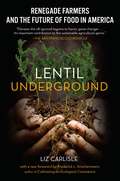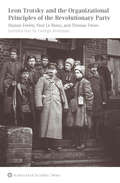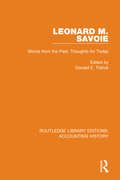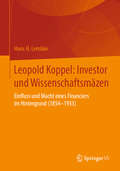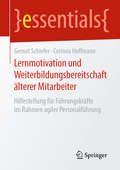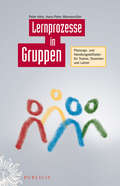- Table View
- List View
Lenguaje Corporal: ¡Su guía resumida para leer exitosamente a las personas!
by Steven MatthesCon la ciencia, hemos alcanzado un punto en el que es posible dividir a las personas en categorías. Sí, cada persona es diferente y cada persona actúa de manera diferente, pero la comprensión de los rasgos comunes permite categorizar y relacionar a las personas. Comprender a las personas no sólo permite tener una mejor vida social, sino que también constituye una forma de ascender rápidamente en la escala corporativa y lograr buenas relaciones. Estos son los secretos que cada vendedor ha estado esperando. Cuando usted se comunica de manera positiva con su lenguaje corporal, sus palabras tienen más peso que nunca, y cerrar una venta está sólo a un apretón de manos.
Lenguaje Corporal: ¿Te gustaría adquirir un profundo conocimiento de las motivaciones?
by Matthew HarveyEste libro lleva al lector una visita guiada por el subconsciente de las interacciones humanas. Cuando escuchamos sobre la "comunicación de las personas", a menudo pensamos en la communication verbal. Y es solo la parte superior del iceberg. El lenguaje verbal como otras características humanas se relacionan con un proceso evolutivo largo y complicado. El lenguaje verbal podría ser llamado un niño del lenguaje no verbal.
Lenguaje Corporal: ¿cómo Ser Un Detector De Mentiras?
by Joe WezowskiPresentamos casos de estudios basados en experiencias de la vida real del autor, que involucran Agentes “convertidos”, Espías de la KGB y Funcionarios del Gobierno encubiertos. Además, se revela la metodología desarrollada y utilizada por la CIA para detectar el engaño en los ámbitos del contraterrorismo y la investigación criminal, y te muestra cómo puedes aplicar estas técnicas en tu vida diaria. Echemos un vistazo a los temas más importantes que se han tratado en este libro. El Eneagrama, es una herramienta antigua y poderosa que se utiliza para ayudar a las personas a reconocer sus tipos de personalidad y, por lo tanto, a comprender mejor sus acciones, pensamientos y sentimientos de una manera más íntima. Tina Madison ha utilizado este eficaz instrumento en su consulta médica durante muchos años, desarrollando una profunda comprensión de su aplicación en el mundo actual. ¡ Desplácese hacia arriba para comprar su copia hoy!
Lenguaje corporal: Secretos del lenguaje corporal femenino
by Mike PhippsLenguaje corporal: Secretos del lenguaje corporal femenino por Mike Phipps ¿Estás listo para dejar de andar por las ramas y averiguar si le gustas? El lenguaje corporal: los secretos del lenguaje corporal femenino (16B) Si quieres saber cómo leer las señales que te está dando y averiguar si te está mirando como algo más que un encuentro casual, entonces has venido al lugar correcto. Este libro te dirá todas esas pequeñas señales que ella emite. Un hecho que debe saber es que el 7% de cualquier mensaje se transmite a través de palabras, el 38% a través del tono de voz y el 55% a través de señales no verbales. Más de la mitad de la comunicación cara a cara no es verbal. Usted podría estar teniendo una conversación increíble con una mujer toda la noche y pensar que todo va de maravilla. Pero si no puedes captar sus señales no verbales, en el mejor de los casos sólo podrás adivinar si ella te quiere - puedes tirar una moneda al aire.
Lenguaje sin palabras: Aprende a leer el lenguaje no verbal y mejora tus habilidades de comunicación
by Bárbara TijerinaEl lenguaje no verbal es determinante para el éxito o el fracaso en tu vida, en tu trabajo y en tus relaciones. Comunicar no sólo es dar información, sino también transmitir, conmover, persuadir, emocionar y hacer sentir a través de los gestos, la postura y la voz. Tu comunicación no verbal representa el 93% del impacto que causarás en los otros. ¿Cuántas veces te ha pasado que alguna persona te dice "sí", pero sospechas que realmente dijo "no"? El lenguaje sin palabras es el único canal de comunicación en el que es imposible mentir, en el que la gente expresa su yo verdadero, incluso sin darse cuenta; es una herramienta social que ayuda a entender al otro y a conectar mejor con los demás. Este libro te enseñará a leer las emociones y a interpretar el lenguaje no verbal de todos los que te rodean para que descifres qué es lo que están transmitiendo de manera inconsciente y cómo se sienten en determinadas situaciones: -Detectarás seguridad o inseguridad en las personas. -Diferenciarás si muestran arrogancia o frustración o si están a la defensiva. -Sabrás si alguien está nervioso, ansioso o preocupado. -Reconocerás si la persona está interesada o muestra indiferencia. Estas herramientas te permitirán tener congruencia entre lo que dices, lo que haces y lo que eres, y te ayudarán a mejorar la comunicación con los que te rodean y a elegir la manera ideal para transmitir tu mensaje. Si sabes reconocer, identificar y mover las emociones de alguien más, será muy fácil venderle, persuadirlo y hasta hacerlo votar por ti.
Leniency in Asian Competition Law
by Steven Van Uytsel Mark Fenwick Yoshiteru UemuraIn response to cartel formation, competition lawyers and policymakers in nine Asian jurisdictions have experimented with leniency programmes. This mechanism allows firms to come forward with information in relation to their illegal cartel participation in return for a reduction of or immunity from a sanction. The experimentation plays out across three different dimensions: the revision of early adopted leniency programmes, the introduction of newly written leniency programmes, and the decision – deliberate or otherwise – not to create a leniency programme. This volume is the first to analyse the empirical evidence across a number of countries to determine how effective these measures have been, and how they have been amended in response to problems encountered. In this volume, local experts from key Asian jurisdictions, together with international experts, offer an introduction to this fast-developing field, and explore the theoretical, international and regulatory contexts of leniency programmes.
Lenin Reloaded: Toward a Politics of Truth
by Slavoj I Ek Sebastian Budgen Stathis KouvelakisLenin Reloaded is a rallying call by some of the world's leading Marxist intellectuals for renewed attention to the significance of Vladimir Lenin. The volume's editors explain that it was Lenin who made Karl Marx's thought explicitly political, who extended it beyond the confines of Europe, who put it into practice. They contend that a focus on Lenin is urgently needed now, when global capitalism appears to be the only game in town, the liberal-democratic system seems to have been settled on as the optimal political organization of society, and it has become easier to imagine the end of the world than a modest change in the mode of production. Lenin retooled Marx's thought for specific historical conditions in 1914, and Lenin Reloaded urges a reinvention of the revolutionary project for the present. Such a project would be Leninist in its commitment to action based on truth and its acceptance of the consequences that follow from action. These essays, some of which are appearing in English for the first time, bring Lenin face-to-face with the problems of today, including war, imperialism, the imperative to build an intelligentsia of wage earners, the need to embrace the achievements of bourgeois society and modernity, and the widespread failure of social democracy. Lenin Reloaded demonstrates that truth and partisanship are not mutually exclusive as is often suggested. Quite the opposite--in the present, truth can be articulated only from a thoroughly partisan position. Contributors. Kevin B. Anderson, Alain Badiou, Etienne Balibar, Daniel Bensad, Sebastian Budgen, Alex Callinicos, Terry Eagleton, Fredric Jameson, Stathis Kouvelakis, Georges Labica, Sylvain Lazarus, Jean-Jacques Lecercle, Lars T. Lih, Domenico Losurdo, Savas Michael-Matsas, Antonio Negri, Alan Shandro, Slavoj Žižek
Lenkpreiskoordination des Leistungsaustauschs multinationaler Unternehmen bei Währungsrisiko
by Tobias KochemsEine der wesentlichen Aufgaben des Controllings besteht in der Koordinationsfunktion, mittels der eine optimale Ressourcenallokation erreicht werden soll. Während zentrale Vorgaben mit einer Demotivation der dezentralen Entscheidungsträger einhergehen können, kann das autonome Handeln der dezentralen Entscheidungsträger zu einer mangelnden Harmonisierung der Unternehmensziele führen. In multinationalen Unternehmen erhöht sich die Komplexität zur optimalen Steuerung durch interne und externe Einflüsse, wie z. B. Währungsrisiken, enorm. Aus der Vielzahl der Koordinationsinstrumente steht in dieser Arbeit der Lenkpreisansatz im Vordergrund, wobei die Ziele des Lenkpreisansatzes und die Ziele des Währungsmanagements unter der Berücksichtigung der Risikoeinstellung der Entscheidungsträger konzeptionell verknüpft werden. Das Koordinationskonzept beinhaltet neben der optimalen Steuerung der internationalen Leistungserstellung auch Überlegungen zum nutzenoptimalen Zentralisierungsgrad des Währungsmanagements.
Lenovo to Buy IBM PC: Integration Challenges
by Christine Snively David G. FubiniIn December 2004, Chinese computer manufacturer Lenovo announced its purchase of IBM's PC division. At the time, few industry observers were optimistic about the merger of these entities with seemingly opposite company cultures. How should the two entities plan to integrate?
Lenovo: Building a Global Brand
by John A. QuelchAnnounced in December 2004, the $1.75 billion acquisition of IBM's PC division by Lenovo, China's largest PC maker, made headlines around the world. A relative upstart in the business, Lenovo acquired the division of IBM that invented the PC in 1981. While Lenovo was arguably the best-known brand in China, it was virtually unknown in the rest of the world. In 2004, over 90% of Lenovo's revenues came from China, but with this major deal, Lenovo aimed to become a global technology giant. As a new multinational with 20,000 employees operating in 138 countries, Lenovo needed a global marketing and branding strategy to extend its global reach. This meant determining what Lenovo stood for and designing products that supported that claim. In January 2006, 13 months after the deal was announced and eight months after it closed, Lenovo is preparing for the intense limelight that would come with its sponsorship of the February 2006 Turin Winter Olympics. There, it plans to introduce a Lenovo-branded product line designed from the bottom up for the small to medium enterprise space--a move considered very bold and risky by many observers.
Lenovo: Building a Global Brand
by John A. QuelchAnnounced in December 2004, the $1.75 billion acquisition of IBM's PC division by Lenovo, China's largest PC maker, made headlines around the world. A relative upstart in the business, Lenovo acquired the division of IBM that invented the PC in 1981. While Lenovo was arguably the best-known brand in China, it was virtually unknown in the rest of the world. In 2004, over 90% of Lenovo's revenues came from China, but with this major deal, Lenovo aimed to become a global technology giant. As a new multinational with 20,000 employees operating in 138 countries, Lenovo needed a global marketing and branding strategy to extend its global reach. This meant determining what Lenovo stood for and designing products that supported that claim. In January 2006, 13 months after the deal was announced and eight months after it closed, Lenovo is preparing for the intense limelight that would come with its sponsorship of the February 2006 Turin Winter Olympics. There, it plans to introduce a Lenovo-branded product line designed from the bottom up for the small to medium enterprise space--a move considered very bold and risky by many observers.
Lens on Life: Documenting Your World Through Photography
by Stephanie C. RobertsMostly candid and spontaneous, documentary photography serves to preserve a moment in time. In Lens on Life, celebrated documentary photographer Stephanie Calabrese Roberts inspires you to explore, shoot, and share documentary photographs, guiding you as you define your own style. Illustrated with the author's striking artwork as well as that of eight seasoned photographers who have visually documented stories all over the world, this book will sharpen your artistic intuition and give you the confidence to take on personal or professional documentary assignments. Full of advice that will challenge you and strengthen your photography, Lens on Life shows you how to capture an authentic view of your world.
Lentil Underground: Renegade Farmers and the Future of Food in America
by Liz CarlisleA protégé of Michael Pollan shares the story of a little known group of renegade farmers who defied corporate agribusiness by launching a unique sustainable farm-to-table food movement.<P><P> The story of the Lentil Underground begins on a 280-acre homestead rooted in America's Great Plains: the Oien family farm. Forty years ago, corporate agribusiness told small farmers like the Oiens to "get big or get out." But twenty-seven-year-old David Oien decided to take a stand, becoming the first in his conservative Montana county to plant a radically different crop: organic lentils. <P> Unlike the chemically dependent grains American farmers had been told to grow, lentils make their own fertilizer and tolerate variable climate conditions, so their farmers aren't beholden to industrial methods. Today, Oien leads an underground network of organic farmers who work with heirloom seeds and biologically diverse farm systems. Under the brand Timeless Natural Food, their unique business-cum-movement has grown into a million dollar enterprise that sells to Whole Foods, hundreds of independent natural foods stores, and a host of renowned restaurants.<P> From the heart of Big Sky Country comes this inspiring story of a handful of colorful pioneers who have successfully bucked the chemically-based food chain and the entrenched power of agribusiness's one percent, by stubbornly banding together. Journalist and native Montanan Liz Carlisle weaves an eye-opening and richly reported narrative that will be welcomed by everyone concerned with the future of American agriculture and natural food in an increasingly uncertain world.
Leon Trotsky and the Organizational Principles of the Revolutionary Party
by George Breitman Paul Le Blanc Dianne Feeley Thomas TwissThis is the first comprehensive examination of Leon Trotsky's view on revolutionary organizational principles, and the dynamic interplay of democratic initiative and principled centralism. Mostly in his own words, these writings are grounded in Trotsky's experience in Russia's revolutionary movement, as a leader of the International Left Opposition and Fourth International.
Leonard M. Savoie: Words from the Past, Thoughts for Today (Routledge Library Editions: Accounting History #32)
by Donald E. TidrickThis book, first published in 1995, collects together 26 of Leonard M. Savoie’s key speeches, all previously unpublished. Savoie was a titan in accounting education and these chapters are of valuable historical importance to the field. Section 1 consists of reports to council of the AICPA, Section 2 deals with general professional and educational issues, and Section 3 focuses on specific accounting and auditing standard-setting issues.
Leopardology: The Hunt for Profit in a Tough Global Economy!
by Kivi BernhardLeopardology™ – the art of Positive Predatory Thinking. Critical business strategy, gleaned from the hunt of the African leopard. Critical business thinking and strategy, gleaned from the hunting habits and techniques of the African leopard, perhaps the most successful predator on earth! Using the hunting habits and techniques of Africa’s most successful predator, Leopardology TM draws metaphors of personal and business success that will simply leave you spellbound! Having the “lion's share” of market territories and clients, to which corporations have been accustomed, is no longer the case. Competitor predators are continually on the prowl for your market share and profit. On the plains of the African savannah, deficiencies of vision, strategy, trust and change-management are often the indicators that lead alert predators to easy prey. Not unlike the world of commerce, in the bushlands of Africa, if one is not hunting to survive, one will simply survive to be hunted!
Leopold Koppel: Einfluss und Macht eines Financiers im Hintergrund (1854–1933)
by Hans H. LembkeLeopold Koppel (1854 –1933) war zu seiner Zeit eine der bedeutendsten Persönlichkeiten des deutschen Wirtschaftslebens, als Investor und Stifter. Sein erster großer Coup gelang ihm in der Gasbeleuchtung, sein zweiter mit elektrischem Licht – und der Marke Osram. Mittels Übernahme chancenreicher Unternehmen besetzte er auch in der Hotellerie und Gastronomie erste Plätze. Neue Dimensionen erschloss er sich als Wissenschaftsmäzen mit Allerhöchster Anerkennung. Als erstrangiger Financier der Kaiser-Wilhelm-Gesellschaft setzte er auf die Physikalische Chemie, die er auch rüstungs-industriell nutzte. In den Weimarer Jahren schwanden Tatkraft und Bedeutung, doch selbst den Rückbau seines Konzerns unternahm er strategisch. Leopold Koppel starb im Spätsommer 1933; die Enteignung blieb ihm erspart. Zwei Enkel wurden im US-Exil zu erfolgreichen Unternehmern, ebenfalls mit Zugang zum politischen Gipfel.Der InhaltBiografie eines Unternehmers im HalbschattenDer Selfmademan aus fast namenloser FamilieDer Wettlauf zwischen Strom- und GaslichtDer Durchbruch der elektrischen LichttechnikDie Investitionschancen in umkämpften ZukunftszweigenDie Hotelbetriebs-Gesellschaft Der Wissenschaftsmäzen in kaiserlicher GunstDie Expansion in die Kriegswirtschaft Der Konzernumbau in den zwanziger Jahren Der Niedergang Die Unternehmensrelikte und Bruchstücke des VermögensDer AutorProf. Dr. Hans H. Lembke lehrte Wirtschaftswissenschaften an der Technischen Hochschule Brandenburg.
Lernen durch Herausforderung: Studierendenzentrierte Hochschullehre in Wirtschaft und Gesundheitsmanagement (essentials)
by Dietmar Sternad Florian BuchnerDie Autoren stellen in diesem essential einen herausforderungsbasierten und studierendenzentrierten Ansatz der Hochschuldidaktik vor, mit dem Studierende neben fachlichen Inhalten gleichzeitig auch Probleml#65533;sungsf#65533;higkeiten, analytische und soziale Kompetenzen sowie die F#65533;higkeit zur Selbstreflexion und -entwicklung erwerben und anwenden k#65533;nnen. Basierend auf aktuellen Erkenntnissen der Motivations-, Lern- und Neurowissenschaften wird ein praxisorientiertes Lehr- und Lernmodell pr#65533;sentiert, in dem Herausforderungen, aktives Handeln, Feedback und Reflexion im Zentrum stehen. Studierende sollen dabei zu selbstst#65533;ndigem kritischem Denken motiviert werden. Das essential enth#65533;lt zahlreiche Tipps f#65533;r eine die Studierenden aktivierende und motivierende Form des Lehrens und Lernens sowie konkrete Anwendungsbeispiele aus der Lehrpraxis.
Lernen im Zeitalter der Digitalisierung: Einblicke und Handlungsempfehlungen für die neue Arbeitswelt
by Andre M. Schmutte Axel Steuernagel Mark Harwardt Peter F. -J. NiermannDas Buch zeigt, warum lebenslanges Lernen in Zeiten der Digitalisierung und der digitalen Transformation für Führungskräfte, Organisationen und Unternehmen im Sinne der unternehmerischen sowie persönlichen Weiterentwicklung wichtig sind. Die Verzahnung von Arbeiten und Lernen im Alltag nimmt stetig zu und zukunftsweisende Technologien und innovative Lernformate ergänzen klassische Lernsysteme, um das digitale Lernen in der Arbeitswelt 4.0 zu unterstützen. So werden virtuelle Welten und Künstliche Intelligenz nach und nach zu einem neuen Bestandteil von Lern- und Trainingsprogrammen. Doch was bedeutet digitales, agiles und informelles Lernen? Was versteht man unter New Leadership? Was sind die individuellen und organisationalen Voraussetzungen für digitales Lernen in Unternehmen? Wie kann sich Künstliche Intelligenz auf die Arbeitswelt auswirken? Wie verändert sich Talentmanagement durch die Digitalisierung?Mit diesen Fragen beschäftigen sich renommierte Experten aus der Praxis und geben konkrete Handlungsempfehlungen für das digitale Lernen.
Lernen leben: Ein Praxisleitfaden zu Lernkultur und Lernkompetenz für Führungskräfte und Change Agents
by Sabrina MalterWie gestalte ich als Führungskraft eine Kultur der Lernbegeisterung und Veränderungsbereitschaft in meinem Team? Wie baue ich bei meinen Mitarbeitenden die dafür erforderlichen Fähigkeiten auf? Und wie gestalte ich eine Lernkultur im gesamten Bereich oder Unternehmen? Dieses Fachbuch gibt Antworten auf diese Fragen und leitet Führungskräfte und Change Agents an, aktiv eine Kultur des kontinuierlichen Lernens und des konstruktiven Umgangs mit Veränderungen zu gestalten. Führungskräfte sind dadurch in der Lage, mit ihrem Team auch in unsicheren Zeiten ambitionierte Ziele zu erreichen, Probleme zu lösen und so einen starken Beitrag zum Unternehmenserfolg zu leisten. Die Modelle und Methoden sind praxisnah aufbereitet, die Autorin gibt wichtige Hinweise zu möglichen Stolperfallen und Reflexionsfragen helfen bei der direkten Umsetzung. Auf der Webseite zum Buch können ergänzende Materialien wie Workshop-Designs und Checklisten heruntergeladen werden. Interviews aus erfolgreichen Unternehmen geben wertvolle Inspirationen aus der Praxis. Der Inhalt Fördere eine Haltung des Lernens und gestalte eine Lernkultur Denk- und Handlungsmuster des Lernens & praktische Lernkompetenz Reflexion ist der Anfang – der RIPU-Lernzyklus Denken wie ein Forscher – die Lern- und Coaching-Kata So gelingt Veränderung – Veränderungskompetenz durch Lernkompetenz Impulse aus der Praxis
Lernen zu lernen: Lernstrategien wirkungsvoll einsetzen
by Werner Metzig Martin SchusterWer wirkungsvoll lernen will, findet in diesem Buch die richtige Lernmethode für seinen Lernstoff. Jede Lerntechnik wird so beschrieben, dass man sie direkt anwenden kann. Ihre Wirkungsweise wird auf dem Hintergrund der Gedächtnispsychologie erklärt und ihre Wirksamkeit anhand von wissenschaftlichen Studien bewertet. Hinweise zur erfolgreichen Prüfungsvorbereitung sind ebenso enthalten wie Hilfen zum Umgang mit der Angst vor Misserfolgen und mit Lernblockaden.Die vorliegende 10. Auflage ist aktualisiert und enthält ein neues Kapitel zum "Lernen im Alltag".Die AutorenWerner Metzig und Martin Schuster sind Psychologen, die bis zu ihrer Pensionierung als Akademischer Rat bzw. Professor an der Universität zu Köln tätig waren.Stimmen zum Buch:Metzig und Schuster ... geben einen umfassenden und aktuellen Überblick über die Befunde der Lern- und Gedächtnispsychologie, beschreiben effektive Lerntechniken und zeigen mit Alltags-Beispielen ihre praktische Relevanz. ekz-Informationsdienst 3/2010Außerdem gibt das sehr flüssig geschriebene und gut zu lesende Buch viele nützliche Tipps, wie man das Lernen organisiert und Prüfungsangst und Lernblockaden überwindet. ... Ein Buch, das man sich möglichst schon im ersten Semester zulegen sollte. Studium 86/2010Effektive Lerntechniken werden mit Hilfe von Alltags-Beispielen plausibel erläutert und neue Informationen zur Lernmotivation machen das Buch zu einer echten Hilfe für Schüler und Studenten. lehrbibliothek.de 2/2011
Lernen, Motivation und Emotion: Allgemeine Psychologie II – das Wichtigste, prägnant und anwendungsorientiert (Angewandte Psychologie Kompakt)
by Peter Michael BakDieses prägnante Lehrbuch enthält die wichtigsten psychologischen Theorien und Konzepte aus den Bereichen Lernen, Motivation und Emotion. Es ist speziell für Studierende konzipiert, die sich einen starken Praxisbezug wünschen. Die sorgfältige Didaktik, Klausurfragen, digitale Zusatzmaterialien und Zusammenfassungen stellen eine optimale Grundlage für das Verstehen des Lehrstoffes und die Prüfungsvorbereitung im Bereich der Allgemeinen Psychologie II dar. Durch zahlreiche Anwendungsbeispiele, eingebundene Audioclips und Online-Zusatzmaterialien ist es in einzigartiger Weise anwendungsorientiert und weckt dadurch Lust, das Gelernte gedanklich weiterzuentwickeln und in verschiedensten Kontexten umzusetzen.
Lernmotivation und Weiterbildungsbereitschaft älterer Mitarbeiter: Hilfestellung für Führungskräfte im Rahmen agiler Personalführung (essentials)
by Gernot Schiefer Corinna HoffmannDie Lernmotivation älterer Mitarbeiter ist ein komplexes psychologisches Konstrukt, das bisher kaum thematisiert wurde. In Zeiten des demografischen Wandels ist es von zentraler Bedeutung, ältere Arbeitnehmer zur stetigen Weiterbildung zu motivieren, um sie beschäftigungsfähig zu erhalten. Mit zunehmendem Alter zeigen sich Veränderungen der Lern- und Leistungsfähigkeit sowie eine sinkende Motivation für berufliche Weiterbildung. Gernot Schiefer und Corinna Hoffmann zeigen Zusammenhänge zwischen Motivation, Leistung und Lernverhalten auf und analysieren Motivationsfaktoren und Lernhindernisse älterer Arbeitnehmer. Praxisnah stellen die Autoren Möglichkeiten für Unternehmen vor, wie diese zur Förderung der Lernmotivation ihrer älteren Arbeitnehmer aktiv beitragen können.Die Autoren:Prof. Dr. Gernot Schiefer lehrt Wirtschaftspsychologie und Personalmanagement an der FOM Hochschule in Mannheim und arbeitet als Coach und Berater.Corinna Hoffmann, M. Sc. arbeitet im Bereich Human Resources eines internationalen Konsumgüterherstellers.
Lernprozesse in Gruppen: Planungs- und Handlungsleitfaden für Trainer, Dozenten und Lehrer
by Peter Kehr Hans-Peter Wannemüller"Lernprozesse in Gruppen" ist die Antwort auf die Frage: "Gibt es irgendein Buch, das all die Aspekte der Planung und Durchführung von Unterrichten konkret und anschaulich darstellt?" Leser/innen bekommen damit Anregungen und Handlungsideen, mit denen sie - ohne die Eigenschaften des einzelnen Menschen als Lernendem außer Acht zu lassen - Lernprozesse in Gruppen zielorientiert und nachhaltig planen und durchführen können, von der Anfangssituation bis hin zum Abschluss. Das Buch gibt praktische Hinweise zur effektiven Gestaltung von Lernprozessen. Es vermittelt Trainern, Dozenten und Lehrern die nötige Rollenflexibilität und die konkrete Vorstellung davon, wie sie situationsorientiert handeln können. Und es zeigt, wie Pädagogik, Didaktik und Kommunikation sinnvoll verknüpft werden, um Trainings, Seminare, Unterrichte und Kurse zielgerichtet zu planen und lebendig durchzuführen. Mit diesem Buch können die Leser/innen die Qualität ihrer Unterrichte und Seminare überprüfen, sie professioneller planen und durchführen und mehr Sicherheit im täglichen Handeln erreichen. Mit hohem Praxisnutzen behandelt es die Fragen: - Mit welchen Verhaltensweisen schaffe und fördere ich die Arbeitsatmosphäre und den Lernprozess der Gruppe und der einzelnen Teilnehmer? - Wie plane und gestalte ich Lernprozesse zielgerichtet, lebendig und teilnehmerorientiert? - Welche Impulse setze ich? Wie reagiere ich auf Störungen? Das Buch richtet sich an Trainer, Dozenten, Lehrer, Bildungsreferenten, Personalentwickler und Bildungseinrichtungen.
Leslie Brinkman at Versutia Capital
by Robert Steven Kaplan Julie BattilanaLeslie Brinkman is the founder and CEO of a hedge fund, Versutia Capital. Leslie spent late 2002 and early 2003 assembling her team and launched the fund in early 2003. While the firm performed well during 2003 and 2004 (both in terms of returns and new assets), in 2005 the results began to suffer. Describes the process of designing the firm, the resulting team dynamics, the strains on the staff and the impact of Leslie's management style on the performance of her team. In the spring of 2005, Leslie must decide whether to re-design the firm and/or change her management style in order to address the performance issues that Versutia Capital is facing.










